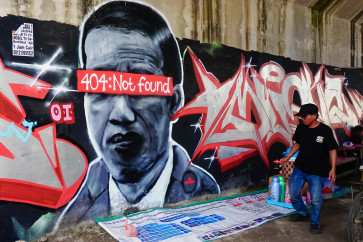Popular Reads
Top Results
Can't find what you're looking for?
View all search resultsPopular Reads
Top Results
Can't find what you're looking for?
View all search resultsJokowi sidelines democracy?
Under such circumstances it is logical that Jokowi attempted (successfully) to create a massive coalition in order to establish a safeguard against defection and challenges within his own coalition.
Change text size
Gift Premium Articles
to Anyone
E
arlier this month, the well-known Journal of Democracy published an article titled “Indonesia: Jokowi Sidelines Democracy”. Just reading from the title alone one can conclude the verdict put out by the authors: Jokowi has intentionally caused the decline of Indonesia’s democracy.
According to the article, during his seven-year tenure as president, Jokowi has prioritized economic development at the cost of democracy. He is “deliberately reducing civil-liberty safeguards and democratic checks and balances” and “reducing electoral safeguards”.
While providing much proof, it is neither appealing nor convincing. While not all the arguments are wrong, the majority of them are borderline weak and lame. Instead the authors’ overall analysis is not as conclusive as the verdict of the title.
The first concern raised by the article is the free and fair quality of the upcoming 2024 elections. There will be simultaneous presidential and legislative elections along with the regional elections in the same year, thus the General Elections Commission (KPU) will have an even more difficult task in 2024 than in 2019. By refusing to revise this simultaneous plan, Jokowi is said to have jeopardized electoral safeguards and thus democracy.
While there were concerns mainly about the death of poll workers, the free and fair quality of the 2019 elections was maintained, as the authors concede. There is a possibility that in 2024 those qualities might be at risk, but that is highly hypothetical and uncertain.
Taking a step back, the fundamental aim of making the elections simultaneous is to improve the quality of governance at every level by making them more in-sync with each other. Better quality of governance will certainly strengthen democracy. There is nothing undemocratic if any president is willing to take some risks to achieve such an important aim.
Related to electoral democracy, Jokowi’s refusal to change the existing election law will require the central government to appoint hundreds of acting regional heads for the transitional period in 2022 and 2023. This is deemed undemocratic since local leaders should have popular mandates.


















